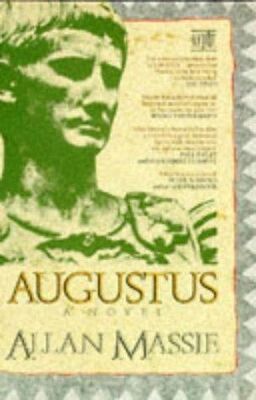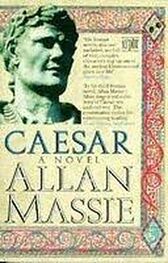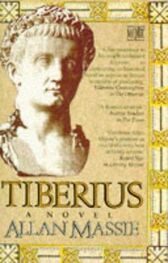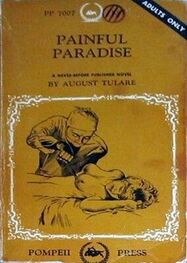Livia was still begging that Tiberius be permitted to return to Rome and I felt that this decision was one that should properly be taken by Gaius. Gaius replied with sagacity:
'You know I have never been on easy terms with my former stepfather, but I am disquieted by the animosity he arouses. The other day at my own table somebody cried out, "Just give the word, Gaius, and I'll sail off to Rhodes and bring back the Exile's head". I think there is danger in such sentiments and of course reproved the man. Lollius believes that Tiberius should stay where he is, but I must tell you, sir, that I have been disappointed in Lollius and suspect him of taking bribes; nor has his advice always been good. On the other hand there are rumours that Tiberius himself has been nursing treasonable projects. The matter is therefore difficult. He came, at his own request, to see me on Samos. You would think having done so he would make an effort to be agreeable, but he was as chilly, sardonic and difficult as ever. He told me I should insist that my staff-officers addressed me with more respect. In fact of course he simply doesn't understand modern manners. It always amazes me that he should be so much more out of touch with my generation than you are, considering that he is at least twenty years younger…'
I at once acquainted Tiberius with the rumours that attached themselves to his name. He replied requesting me to attach 'some reputable and responsible person' to his household that I might receive detailed reports of his words and actions. There was a disagreeable note of false humility in the tone of this letter, but it was certainly a request calculated to disarm suspicion. Not that I held any myself. I knew my Tiberius too well. He would never demean himself by conspiracy. However, having decided that Gaius should properly determine his former stepfather's fate, I relayed this request to him. He at once concluded that Tiberius should be permitted to return to Rome 'before he chokes on his own dignity', but he asked that he be excluded from any political activity. In the circumstances, no decision could have been wiser; I marvelled at the boy's acumen and maturity of judgement, for no decision could have been better calculated either to serve Tiberius' own interest. Tiberius him-self acknowledged the wisdom of Gaius' judgement by the speed with which he acted on it, and by the circumspection he showed on his return. In fact, it was not difficult for him to abstain from politics. They had never been to his taste, and he despised politicians too much. Livia was warmed by his return; it was touching to see mother and son together, both too reticent fully to display their feelings, yet giving off a glow of contentment. Yet here was pain for me too; they sharpened my own sense of what Julia's conduct had deprived me.
Deprivation… Julia, and her own daughter Julia who turned whore too and had likewise to be consigned to an island. (The immoral poet Ovid was involved in her escapade. I sent him to Tomi on the Black Sea, from where he wearies me with self-pitying epistles.) But these were mere personal pains; the daggers touched only me.
Lucius died suddenly, without warning, of a fever at Marseilles on his way to Spain. He had never had the chance to justify his life or display his merits. Only I knew what Rome lost when this flower was cut in its May morning. Gentler than Gaius, more loving than Marcellus, as honourable as Agrippa, he was a boy of infinite capacity.
His death devolved as great a weight on Gaius, as that of Drusus had on Tiberius. Greater indeed, for Gaius was destined to an authority I had never envisaged for my stepsons, and he was also younger and therefore less able to bear the weight imposed on him.
At the time of Lucius' death, he was embroiled in the endlessly recurrent ferment of Armenian politics. Phraates of Parthia had been murdered as a result of a conspiracy encouraged by his son Phraataces; the parricide had succeeded to the throne and promptly instigated a revolution in Armenia, where the slimy, and, as it had turned out, utterly untrustworthy Tigranes was installed as King. It looked as if Armenia would slip out of the Roman sphere of influence, but my dear Gaius acted with exemplary decision and celerity. First, he came to an agreement with Phraataces. It was not ideal but it served the immediate purpose, for the threat of Roman might which Gaius displayed persuaded the Oriental King to abandon his Armenian puppet. Gaius then marched against Tigranes who was killed fleeing from a lost battle, and established Artabazanes of Media on the throne. In a few weeks he had restored the situation and salvaged our interests. No one could have done better, and fired by his success he proposed an expedition into Arabia. Alas, in a frontier skirmish he received a wound. I begged him to return to Italy and rest. He died at Limrya in Lycia.
There is nothing to say, nothing to add to the stark fact. I have only wept once since that day, when I heard of Varus' folly. Only Livia brought me any comfort in my grief. But what comfort could there be? In the East they worship me as a God; it is folly. But what have my prayers to Apollo or Jupiter been but like folly, that they should requite me in this manner?
I have lost interest in religious speculation since Gaius' death. The other day I even thought: perhaps Virgil is merely the poet of our vain and noble dreams? Perhaps it is the trivial and meretricious Ovid who really tells the truth about life?
In such moods I approach despair. Why struggle, as I have always struggled, if the end is stale bread and foetid water?
I have caught myself saying, time and again, 'I found Rome of sun-baked bricks, and leave it of marble.' No doubt the marble will endure; it is something to boast of. I have heard that Antony facing defeat cried out for 'one other gaudy night', called 'all his sad captains… to mock the midnight bell'. I envy him; I cannot swagger in like manner to the Shades… I was sixty-six when they brought me news of Gaius' death. Ten years ago. Ten years of labour that has seemed ever more necessary, ever more meaningless. But of course that is only one mood. I cannot in the end deny my life's work, the restoration of Rome to stability. When I look round the Empire… well, for example, last week when I was sailing through the gulf of Puteoli, we came on a corn-ship from Alexandria. On learning of my presence, its crew decked themselves in white with garlands, and burned incense, explaining that they did so, and wished me enduring fortune, because they owed me their lives and their freedom to sail the seas. Without my efforts, they said, they would certainly have fallen prey to pirates. I was so touched by their gratitude that I gave each member of my own crew and all my attendants forty gold pieces to spend on Alexandrian ware.
The moment recalled the proudest of my life, sixteen years ago, when the Senate hailed me as 'Father of our Country', the motion to do so being proposed by an old enemy Messella Corvinus, who had fought against me at Philippi. His speech ran as follows:
'Good fortune and the favour of the Gods attend thee and thy house, Caesar Augustus; for thus we feel that we are praying for a lasting prosperity for our country and happiness for our beloved City. The Senate and the people of Rome hail thee Father of thy Country…' To which I replied:
'Conscript Fathers, I have attained my highest hopes. What more have I to ask of the immortal Gods than that I may retain this, your unanimous approval, till the last day of my life…?'
I have done so, even in the dark days when news came of Varus' folly, but the mocking Gods took me at my word and withdrew their favour from me. I could not abstain from public business in mourning Gaius. It was necessary to make new plans for the succession, for the transmission of power and authority in orderly fashion, that my life's work be not destroyed in a renewal of civil strife. I therefore announced my intention of adopting Tiberius and also my surviving grandson Agrippa Postumus, whose unsuitability was not yet manifest.
Читать дальше






